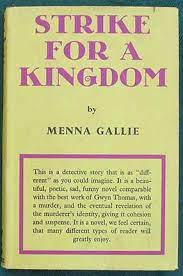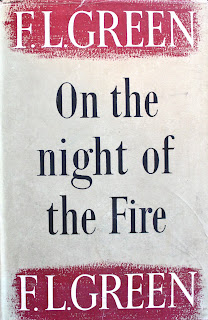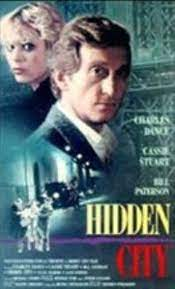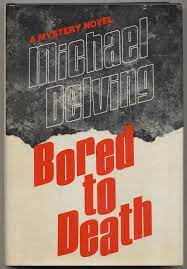Martin Edwards's Blog, page 41
June 16, 2023
Forgotten Book - Strike for a Kingdom

When I was researching Welsh crime fiction for my British Library anthology of Welsh mysteries, I came across several names previously unfamiliar to me, including that of Menna Gallie. Gallie (1919-90) was a Welsh translator, writer, and political activist who only published one novel in the crime genre, Strike for a Kingdom (1959). But it was good enough to be in contention for a Gold Dagger, so I decided to take a look.
The book was reprinted a few years ago by Honno, with a useful intro by Angela V. John which sets the story in context. By today's standards, it's a very short novel, and none the worse for concision. As a detective novel, it has definite limitations, but it's worth reading for the excellent portrayal of a small Welsh mining community, in the fictional village of Cilhendre, at a time of profound stress - the miners' strike of 1926. In other words, it's a history-mystery.
One of the things I liked about the story was the occasional flashes of wit. Times were tough in those days - the locals dream about nationalisation of the mines leading to a sort of modern utopia - but although some of the social issues are presented in a partial and simplistic way, the characterisation is mostly very good and in some cases poignant.
Exceptions to this are the victim (the nasty manager of the mine) and the police inspector: both are cartoonish figures. But there's a humanity about much of the writing that appealed to me. For a first novel, it's a very mature piece of work. Gallie continued to publish occasionally, but moved away from mysteries, probably because the constraints of plotting didn't suit her priorities as an author. If you like Welsh fiction - and Wales is a country I've always loved, so I do, very much - then this is well worth a read.
June 14, 2023
Long Weekend - 1978 film review

Concern about damage that human beings do to their environment isn't new. In fact it's at the heart of an Australian film dating back to 1978 called Long Weekend. This is a film which is sometimes described as a 'cult classic'. Cult classics, of course, come in all kinds of forms. The term encompasses wonderful projects that were wrongly overlooked on first airing as well as strange projects that will only ever appeal to a minority. Long Weekend comes close to falling into the second category, but I found it quite interesting.
It is, however, a film that telegraphs its punches. Even the advertising poster proclaimed: 'Their crime was against nature. Nature found them guilty.' So you soon have a pretty good idea of what lies in store. The story is about a couple whose marriage is in trouble. Peter (John Hargreaves) persuades a reluctant Marcia (Briony Behets) to go away to a remote beach for a long weekend. Not a good idea...
The pair of them aren't especially likeable. Peter does at least love his dog, Cricket, but he and Marcia are strangely unbothered when their car accidentally runs over a kangaroo. When they stop off for refreshments, Peter is baffled when the locals say they've never heard of the couple's destination. It's only five miles away, he says - near the abbatoir. Oh dear, again we can be sure this isn't going to end well.
The mysterious nature of the elusive beach is under-played, which is a pity. Instead, the action is dragged out as it becomes increasingly clear that Peter and Marcia are going to pay a heavy price for their indifference to and abuse of the natural world. I wasn't quite sure that the symbolism of Marcia's recent abortion fitted the story. Yet there was something about this film that I couldn't help liking. I'm unfamiliar with Hargreaves, and sadly it turns out that he died young from AIDS; he puts in a good performance with touches of nuance. There's a really good story here that would have benefited from a more carefully written script. Even if it's not a cult classic, I'm quite glad to have watched it.
June 12, 2023
Alibis in the Archive 2023



I'm in the midst of a whirl of activity with a fantastic variety of trips. More of this another day, but today I'm reflecting on the weekend just past, which saw the latest Alibis from the Archive festival at Gladstone's Library. The photos were taken by Caroline Raeburn, whom I was delighted to see again, on her first visit to this wonderful place. Among many others, it was especially good to see Liz Gilbey, Steve Barge, Mike Wilson, Mary Andrea Clark, Carrie de Silva, Mark Green, and Susan Cooper, the last two taking a breather from their prep for Bodies from the Library. It was also good to meet a number of people for the first time.
Because of major traffic issues, everyone had a pretty tricky journey to Hawarden on Friday, and this meant that the welcome kindly organised by the new Warden of Gladstone's, Andrea Russell, had to be delayed by an hour. But a drink soon meant the recovery process kicked in for everyone, and it was a delight for me to meet Andrea for the first time since her arrival at Gladstone's, and to discover that she is a genuine crime fan.
After dinner on Friday, I hosted a quiz, won by a team including Jonathan Hopson, who has been on the winning team three times running. Jonathan, a volunteer at the Library, has a terrific range of knowledge. There was time for a chat with many of the attendees before the end of the day.
Saturday began with an entertaining talk from Dolores Gordon-Smith about the Bravo case, followed by me talking about the CWA's 70 year history. Then came Felix Francis, a born raconteur, talking about the 'family business' that created the bestselling Dick Francis novels. After lunch we had a special display of items from the British Crime Writing Archives and then a talk by Len Tyler about humour in crime fiction. After dinner, Felix, Dolores and I, plus a few others were able to watch the European Champions League final and I was duly delighted when Manchester City triumphed and completed the coveted 'Treble'.
On Sunday, we began with a talk by Tim Sullivan (third photo above) about his career in film, TV, and fiction, and an equally enjoyable talk by Matthew Booth about Golden Age fiction. Last but by no means least came Chrissie Poulson, discussing academic detective stories. After Sunday lunch we said our goodbyes and both I and the very supportive and hard-working library staff were thrilled with the feedback. About a quarter of the attendees had never visited the Library before - and not surprisingly, they were impressed with this wonderful venue. My thanks go to everyone who took part for making it such a great occasion.
I'm in the midst of a whirl of activity with a fantastic...



I'm in the midst of a whirl of activity with a fantastic variety of trips. More of this another day, but today I'm reflecting on the weekend just past, which saw the latest Alibis from the Archive festival at Gladstone's Library. The photos were taken by Caroline Raeburn, whom I was delighted to see again, on her first visit to this wonderful place. Among many others, it was especially good to see Liz Gilbey, Steve Barge, Mike Wilson, Mary Andrea Clark, Carrie de Silva, Mark Green, and Susan Cooper, the last two taking a breather from their prep for Bodies from the Library. It was also good to meet a number of people for the first time.
Because of major traffic issues, everyone had a pretty tricky journey to Hawarden on Friday, and this meant that the welcome kindly organised by the new Warden of Gladstone's, Andrea Russell, had to be delayed by an hour. But a drink soon meant the recovery process kicked in for everyone, and it was a delight for me to meet Andrea for the first time since her arrival at Gladstone's, and to discover that she is a genuine crime fan.
After dinner on Friday, I hosted a quiz, won by a team including Jonathan Hopson, who has been on the winning team three times running. Jonathan, a volunteer at the Library, has a terrific range of knowledge. There was time for a chat with many of the attendees before the end of the day.
Saturday began with an entertaining talk from Dolores Gordon-Smith about the Bravo case, followed by me talking about the CWA's 70 year history. Then came Felix Francis, a born raconteur, talking about the 'family business' that created the bestselling Dick Francis novels. After lunch we had a special display of items from the British Crime Writing Archives and then a talk by Len Tyler about humour in crime fiction. After dinner, Felix, Dolores and I, plus a few others were able to watch the European Champions League final and I was duly delighted when Manchester City triumphed and completed the coveted 'Treble'.
On Sunday, we began with a talk by Tim Sullivan (third photo above) about his career in film, TV, and fiction, and an equally enjoyable talk by Matthew Booth about Golden Age fiction. Last but by no means least came Chrissie Poulson, discussing academic detective stories. After Sunday lunch we said our goodbyes and both I and the very supportive and hard-working library staff were thrilled with the feedback. About a quarter of the attendees had never visited the Library before - and not surprisingly, they were impressed with this wonderful venue. My thanks go to everyone who took part for making it such a great occasion.
June 9, 2023
Forgotten Book - On the Night of the Fire

If you're looking for 'cosy' escapism, you'd probably better give F.L. Green's On the Night of the Fire a miss. This book, published in 1939, reads almost as if it was written to demonstrate that crime fiction of the 30s was not all about nostalgic make-believe. It's a doom-laden tale and was the basis of a film released in 1940 and also known as The Fugitive, which has been claimed as the first British film noir. The movie starred Ralph Richardson.
Frederick Laurence Green (1902-53) was born in Portsmouth and died in Bristol, but after marrying an Irish woman spent much of his life in Belfast - and he was himself of Irish descent. He is perhaps best known as the author of Odd Man Out, filmed by Carol Reed and starring James Mason, but it was his second novel, On the Night of the Fire, that made his name. It's the only crime novel I can think of in which the protagonist is a barber.
The book is a sort of 'inverted mystery' in that we follow Wal Kobling's journey from petty thief to burglar to murderer, but there is no puzzle element in the story. And it must be said that the events of the book are as bleak as the drab back streets of the unnamed port town (scenes for the film were shot in Newcastle) in which it is set. This isn't a mystery that will cheer you up. But it's well-written and compelling and Francis Iles (a very good critic as well as a very good writer) was among those who approved.
Green's literary style, on the evidence of this book, is interesting. His material is sensational but he handles it in an almost relentlessly unsensational way. To an extent I was reminded of Patrick Hamilton, but that's mainly because of their shared fascination with the tawdry side of life. I'm not sure I'm 'selling' this book very well, but I must say that I found it distinctive and powerful and whilst it won't suit everyone, I'm very glad I read it.
June 7, 2023
Hidden City - 1987 film review

Way back in 1977, I happened to watch a play on TV. It was called Stronger than the Sun and it was written by a young playwright called Stephen Poliakoff, someone who - I discovered - was only a few years older than me. I was impressed with the story and the quality of the writing and it's no surprise to me that Poliakoff proceeded to enjoy a successful career. When I got the chance to see the first film he wrote and directed, I was glad to seize it.
That film is Hidden City and it has a few elements in common with Stronger than the Sun, which was written ten years earlier. It boasts a good cast, led by Charles Dance, with Cassie Stuart, Bill Paterson, Alex Norton, and Richard E. Grant. However, it doesn't seem to have enjoyed much success in the cinema, and soon made its way to Channel Four. Intriguing as it undoubtedly is, the film does have a number of shortcomings which help to explain why it made little impact.
Dance plays a snooty statistician, James Richards, who complains about the incompetence of a film researcher (Stuart, an interesting actress who seems to have faded from the scene). Oddly, and in an almost Highsmithian way, she latches on to him, pestering him to take an interest in a mysterious piece of film footage that she has found. It seems to show people being abducted. When this unlikely pair of sleuths start to investigate, it becomes clear that the authorities are irritated, to say the least.
I can't really describe this as a crime film, despite the element of mystery, and it's also short of suspense. The real problem is that Poliakoff has come up with a number of good ingredients, but hasn't managed to weld them into a compelling whole. A real shame. There are a number of scenes which simply don't fit - they hold up the flow of events for no clear purpose. I'm glad to have watched it, but there is a good reason why it fell into obscurity.
June 5, 2023
Where the Truth Lies - 2005 film review
I've mentioned more than once on this blog my enthusiasm for the work of Rupert Holmes. I feel quite an affinity for him simply because we were born in the very same hospital, but quite apart from that, I've long admired his talent and versatility. In February 2020, in those far-off pre-pandemic days, I delighted in his musical Curtains and I've subsequently enjoyed listening to the CD of the US version. He writes terrific popular music and is an accomplished playwright. What's more, he's a crime novelist, and I've now had a chance to watch the film version of his crime novel Where the Truth Lies.
The film was made by Atom Egoyan, a director of some distinction, who also wrote the screenplay. The story draws on Rupert's love of showbiz, and features a comedy partnership between Lanny Morris (Kevin Bacon) and Vince Phillips (the invariably impressive Colin Firth). The duo were stars in the 1950s, but split up following the death of a young woman called Maureen immediately after a telethon they were hosting, even though they weren't implicated in her mysterious demise. The reasons for their break-up are unclear.
Fifteen years later, another young woman, Karen O'Connor (Alison Lohmann) is hired to ghost-write Lanny's memoirs. She was present at the fateful telethon and she wants to find out about the circumstances of Maureen's death. A complicated sequence of events ensue, with several time-shifts between the 50s and the 70s. The plot is tangled, which is just the way I like it, though I also think I'd benefit from watching the film a second time, to appreciate better the way the story is structured.
There are one or two graphic sex scenes, and apparently this affected the film's box office potential. As a result, it's not as well-known as it deserves to be. Brightly filmed as it is, it's really a sort of neo-noir movie, where the shadows of the past loom large. Definitely worth watching. As for the source novel, I look forward to reading it and comparing it with the film.
June 2, 2023
Forgotten Book - Bored to Death

Bored to Death strikes me as a risky title to give to any book. What if a reader can't help yawning? In the case of the first (US) edition of Michael Delving's 1975 novel featuring the book and antique dealer Dave Cannon, the title has a punning significance, given that a body is found caught up on the tidal bore of the river Severn. Nevertheless, I think that Collins Crime Club were wise to give the story another title - A Wave of Fatalities.
One reason I was attracted to buy my copy of this book was that it boasted an interesting inscription, 'to the Baillies who appear on page 10 and page 89'. It turns out that they owned a restaurant in which the author enjoyed dining. A nice example of good-natured advertising.
I enjoyed the first Dave Cannon book that I read, the breezy Die Like a Man. I'd hoped that this novel, unlike that one, would be a kind of bibliomystery, but in fact the story revolves around an ancient casket, and I find antiques a less interesting subject - purely a matter of personal taste, but it was a disappointment, increased by the fact that the story isn't as good as Die Like a Man.
In this book, Dave is accompanied by his wife Lucy and her family play a significant part in the story. Dave meets a strange and irritating chap called Piscobar, who also becomes a key suspect after it emerges that the man in the river was a murder victim. Was he killed for the sake of the casket?
I must be honest and say that I didn't care too much about the characters and thus although I wasn't exactly bored, I wasn't unduly interested in solving the puzzle. Delving - whose real name was Jay Williams - writes agreeably, and there is a very interesting discussion about what it is to feel like an outsider in an enclosed community. Williams spent quite a lot of his time in Britain and I sense that he wrote these passages from the heart. Otherwise, though, this is a lightweight piece of work.
May 31, 2023
Framed - 2021 film review

Framed is a new film, flawed and low-budget, but quite interesting as an example of an attempt to rewrite Rear Window as a story about moral dilemmas. Thomas Law plays Karl, who quits his job in order to pursue his dream of becoming a photographer. He becomes intrigued by an attractive female neighbour, and starts to take pictures of her from his London flat, as she appears at her own window in various states of undress.
Karl has a good friend in Virginia (Lottie Amor), who works for a law firm (although she doesn't display in-depth legal knowledge, to put it kindly). She finds out about Karl's photographic pastime and disapproves. Things become a little more complicated when Karl not only keeps snapping pictures but finds himself encouraged to do so by the neighbour. She sends him encouraging messages and starts to pose for him. Then Karl sees a man appearing in the neigbour's flat.
There's quite a bit of discussion about personal privacy in this film, although I think some reviews have been over-generous about the merits of that discussion: it's conducted on a pretty unsophisticated level and doesn't strike me as being as intelligent or as thought-provoking as some have claimed. The storyline of the film simply isn't strong or smart enough to enable writer-director Nick Rizzini to make many particularly meaningful or memorable points.
There are thrillerish touches in the film, and an obviously phoney policeman makes an appearance at one point. Judged as a mystery, Framed doesn't succeed, but I don't think it should be judged as a mystery. Karl's naivete and foolishness are irritating, but the two lead actors are an appealing couple, and the real strength of the film lies in the depiction of the way their stuttering relationship develops, despite their disagreements about Karl's voyeuristic behaviour. And because of that focus on character, despite having numerous reservations, I did quite enjoy Framed.
May 29, 2023
Where the Crawdads Sing - 2022 film review

Where the Crawdads Sing is a film based on Delia Owens' book of the same name - a first novel published by an author in her late 60s which became an international bestseller. I haven't read the book, and I've read some reviews which suggest that the film is inferior - but in that case the novel must be exceptional, because I thought the film was very good.
The setting is an American marshland. Not a locale that I'm familiar with, but I did once go on a boat trip around the marshes of Grand Cayman which reminded me a little of the film's setting, despite being on a smaller scale. It's an evocative background, and makes for very attractive cinematography.
At the start of the story, a young man's body is discovered by two cops. He has fallen from a fire tower and soon murder is suspected. The victim has been seen around with a local girl known as 'the marsh girl'. When the cops approach her she flees, only to be caught. What is more, she is then put on trial - on evidence that seemed to me rather flimsy, to say the least.
Most of the film takes the form of an extended flashback, with scenes from the trial intercut. We learn the story of Catherine 'Kya' Clark, who was abandoned by both her parents and her brother and grew up on her own in the marshes. A relationship with a young man peters out and she gets involved with the murder victim, a much less appealing character.
It's really quite a straightforward story, but so well directed by Olivia Newman that the film's length didn't bother me. The locale is terrific and so too is the performance of Daisy Edgar-Jones as Kya. Astonishingly, Daisy is English. A glittering future beckons for her.



